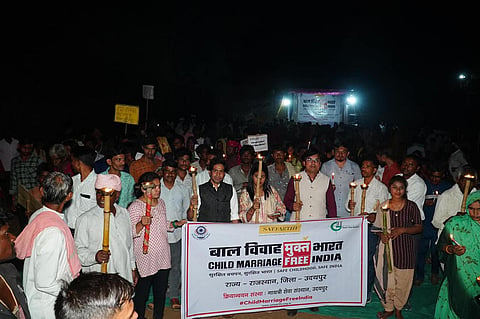
New Delhi/Udaipur- In a landmark judgment, the Supreme Court of India has issued critical guidelines to ensure the effective implementation of the Prohibition of Child Marriage Act (PCMA) 2006, declaring that child marriage robs children of their fundamental right to choose their own life partner. The apex court stressed that child marriage not only violates the autonomy of children but also undermines their overall well-being and future prospects.
Delivering the verdict, the bench, led by Chief Justice D.Y. Chandrachud and Justices J.B. Pardiwala and Manoj Misra, outlined a detailed strategy for addressing the widespread issue. The court emphasized the need for a prevention-protection-prosecution approach, while adopting a community-driven strategy to combat child marriage across the country. It underscored the importance of collaboration among stakeholders, including government institutions, religious organizations, and civil society, to ensure that the law is implemented in both "letter and spirit."
Among the key directives, the Supreme Court has called for schools, religious institutions, and Panchayats to be centers of awareness generation, aimed at educating communities about the legal and social consequences of child marriage. In regions where child marriage persists, educational curricula should include information about its prevention and the rights of children.
“The law will only succeed when there is multi-sectoral coordination," remarked Chief Justice Chandrachud while reading the judgment. "Training and capacity building of law enforcement officers is essential, and community-driven approaches are imperative."
The petition that led to this verdict was filed by SEVA (Society for Enlightenment and Voluntary Action), along with child rights activist Nirmal Gorana Agni. SEVA argued that despite the existence of the child marriage statute, its non-implementation continues to hinder the effort to eliminate this harmful practice.
In Udaipur, a meeting was convened at the Gayatri Seva Sansthan to celebrate the judgment. Dr. Shailendra Pandya, a child rights expert and a key member of the CMFI campaign, hailed the court's decision as a major step forward in eradicating child marriage. He urged state governments to quickly formulate action plans in line with the Supreme Court’s guidelines, with the shared goal of making India child marriage-free by 2030.
Nitin Paliwal, coordinator of Gayatri Seva Sansthan, expressed similar sentiments: “This is a significant judgment for all of us. The state government and local authorities have already demonstrated commitment to ending child marriage, and this verdict gives them further momentum. We express our deep gratitude to the apex court for this clear and strong interpretation of the law.”
The Child Marriage-Free India (CMFI) campaign has made remarkable progress in recent years, preventing over 120,000 child marriages across India. Government initiatives, in collaboration with CMFI partners, have also protected more than 1.1 million children at risk of being married off prematurely.
Emphasizing on how this landmark judgement will put India on the world map in ending this social menace, Bhuwan Ribhu, Founder of ‘Child Marriage Free India’ campaign, said, “This landmark judgement will be a shot in the arm and shall be the tipping point in institutional resolve marking a significant victory in our mission to completely eradicate child marriage. The Supreme Court and the Government efforts have shown that they care for our children, it is time for the rest of us to step up and stop this social crime.”
“If we fail to protect our children, nothing else in life truly matters. The guidelines issued by the Court further reinforce a holistic approach, also given by the PICKET strategy, of the ‘Child Marriage Free India’ campaign. Child marriage is, in essence, child rape. This decision not only strengthens our resolve but also underscores that through united efforts and accountability, we can ultimately end the worst form of violence against children, child marriage," he further stated.
The campaign, with over 200 NGO partners, follows a comprehensive strategy known as PICKET (Policy, Institution, Collaboration, Knowledge, Ecosystem, Technology). This multi-faceted approach includes working with religious leaders and communities to raise awareness. So far, the coalition has secured over 49 million pledges from individuals across India, and in 2023-24, they succeeded in establishing over 50,000 “child marriage-free villages.”
You can also join our WhatsApp group to get premium and selected news of The Mooknayak on WhatsApp. Click here to join the WhatsApp group.